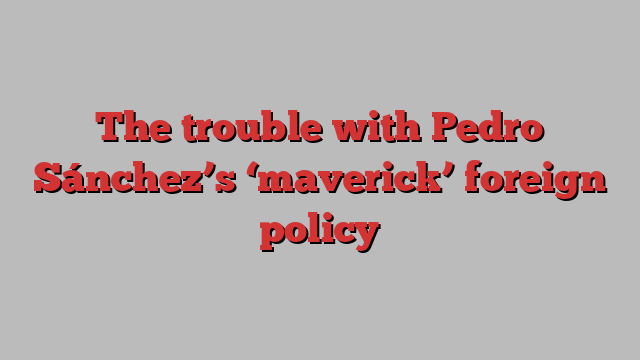
Unlock the Editor’s Digest for free
Roula Khalaf, Editor of the FT, selects her favourite stories in this weekly newsletter.
When Pedro Sánchez takes the international stage, he is often described as tall, handsome, and a better English speaker than previous Spanish prime ministers. But he has now given people something else to comment on: his foreign policy swerves.
Sánchez’s allies say he is “being brave”. His critics, including some Spanish diplomats, call him an erratic “maverick”.
The most striking part is how he has bucked other EU powers on Israel, China and immigration, marking a break with Spain’s aversion to diplomatic conflict.
For most of its 38 years in the EU the country has been a conformist member — grateful to the bloc for helping end its Franco-era isolation and for the funding it received.
Now Sánchez has changed that. For a man who calls himself a “convinced pro-European”, his twists and turns can appear to defy logic. But the explanation may lie closer to home.
In the Middle East, where he has been a fierce critic of Israel’s assaults on Gaza and Lebanon, he formally recognised Palestinian statehood in May. Although Ireland followed suit, his move was a rebuff to larger EU powers that said recognising Palestine at that time would achieve nothing — and exhaust a source of leverage with the Israelis.
Then in September Sánchez went to China for the second time in 18 months to meet President Xi Jinping, avoiding public comments on anything that would upset Beijing and catching his EU peers off guard by declaring that the bloc needed to “reconsider” its plans to impose tariffs on Chinese electric vehicles.
“These things are noticed. In Brussels, you have to be reliable,” said Ana Palacio, who was Spain’s foreign minister in a previous government led by the conservative People’s party. “If you are pro-European, you don’t create convulsions.”
Sánchez is setting himself apart on immigration too. The European Commission last week proposed exploring the use of controversial “return hubs” outside the bloc for people with no right to stay in the EU. In recent days Sánchez has attacked this rightwing pivot as economic suicide and accused other governments of “stigmatising” immigrants.
José Manuel Albares, Spain’s foreign minister, says it is pursuing a foreign policy “with a distinct identity” and that Spain has gained “unprecedented presence, voice and influence”.
Sánchez wants to make the most of Spain’s position as the EU’s fastest growing big economy; a bridge to north Africa and Latin America; and a force on the front lines of renewable energy, climate change and migration.
He may lead a precarious minority government, but he is on more solid ground than Germany’s Olaf Scholz, another socialist leader. Spain sees validation in the appointment of Teresa Ribera, Sánchez’s former deputy prime minister, as a powerful new competition and environment commissioner in Brussels.
Albares said Spanish foreign policy was “based on the defence of peace, democracy and human rights”. Sánchez’s allies argue that he is being faithful to the EU’s values. The problem, they say, is that others in the bloc are forgetting them.
But there are inconsistencies.
Sánchez is a vocal supporter of Nato and Ukraine and has granted €1bn of military aid to Kyiv this year. Yet Spain dragged its feet on giving Ukraine Leopard tanks, declined to hand over a Patriot air defence system, and currently spends less on defence as a proportion of GDP than any other Nato member.
Sánchez’s support for Palestinians, meanwhile, contrasts with his position on Western Sahara, a region that is seeking independence from Morocco.
Sánchez abandoned Spain’s long-standing neutrality in a 2022 U-turn, endorsing a Moroccan plan to give the region more autonomy but keep it under Rabat’s grip. The move cost Spain crucial gas supplies from Algeria, which backs Western Sahara’s independence. But it was driven by the need to patch up relations with Morocco, which Spain depends on to keep a lid on irregular migration.
Carlos Miranda, a former Spanish ambassador to Nato and the UK, said: “There’s nothing in his policies that follows any kind of planning. It’s all about responding to specific needs.”
On China, EU members approved the EV tariffs this month and Spain ended up abstaining. Madrid wants to head off the threat of Chinese retaliation against Spanish pork exports — but it remains unclear whether it did enough by abstaining, rather voting against the tariffs as five other countries did.
José Antonio Sanahuja, professor of international relations at Madrid’s Complutense university, said: “Sánchez is fundamentally a tactician.”
But the strategy void, he said, also reflected a lack of political consensus on international affairs at home, which means “many foreign policy issues appear or disappear” depending on their domestic utility.
Most Spanish voters are not engaged with global affairs, but Sánchez’s actions are aligned with the instincts of a majority who are anti-war and pro-Palestinian, open to migration but wary of Morocco, and eager for jobs. Being a maverick on the global stage helps him shore up support at home.